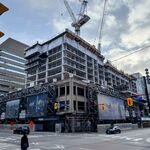Basshats
Active Member
Please do not feed us with that BS. I can count the number of arts and cultural activities available in ottawa on one hand.
That's one heck of a big hand. Off the top of my head, in July alone, major arts and cultural activities include the Blues Festival, Jazzfest, the Chamber Music Festival, Sound and Light, and the country's biggest Canada Day celebration. I'm assuming the permanent fixtures (NAC, dozen + museums, etc.) don't count, either?




